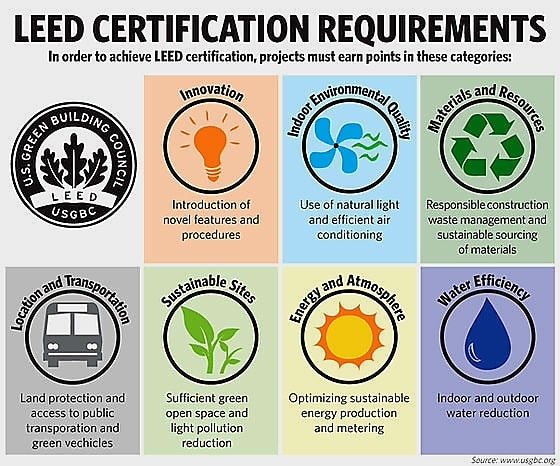LEED stands for Leadership in Energy and Environmental Design.
A LEED-certified building contributes to the circular economy by implementing sustainable and environmentally friendly building materials and practices.
LEED buildings are certified according to a point system.
This system reflects the value of the green practices and responsible land uses the construction represents.
LEED certification is essential in the construction industry because it can reduce a building’s operating costs and increase its market appeal and value.
Although the U.S. Green Building Council has promoted green building practices since 1993, interest in green buildings is growing.
As heat indexes rise and weather patterns become more erratic, saving on energy costs is becoming more critical. Stories of Texas power grids that can’t handle the loads from extreme heat and cold are examples.
LEED certification signals that a building was constructed using sustainability and environmentally ethical practices. Let’s examine all the reasons LEED certification is so crucial.
A Move to a Circular Economy
Wondering what a circular economy is? Essentially it’s a model for production sustainability.
Traditional or linear economies work by producing goods, selling them, consumers using them, and then throwing away waste.
Unfortunately, that waste ends up in landfills and sits there for decades, either decomposing or not.
Under a circular model, manufacturers still produce and sell goods. Consumers continue using them.
However, actual and potential waste becomes recycled, refurbished, reused, or repaired. Simply put, waste doesn’t happen or is minimized.
LEED certification helps accomplish the principles of a circular economic model.
Examples include using recycled building materials and additional features like heat-reflecting paint that reduces the strain on cooling systems in hot climates. Other features like natural lighting can minimize electricity and natural gas use.
Boost Company Image and PR
Although advertising sustainability or green practices won’t necessarily sway some consumers, doing so can establish your brand’s identity.
Research shows that among Generation Z, sustainability and eco-conscious consumption are top values and purchase drivers.
Technically, Gen Z includes people born in 1996 or later.
However, some research publications extend the millennial generation through the year 2000.
Generally speaking, Gen Z shoppers are in their teens and early 20s. The oldest ones are 24. To appeal to this up-and-coming group of consumers, your brand identity has to include sustainable practices.
This generation is less willing to overlook unethical and poor business practices. The older members of Gen Z are undoubtedly looking for their first apartments or their next living situation.
Apartments and condos in LEED-certified buildings are more likely to attract tenants.
Rental rates show a sustained average to above-average demand for these properties.
Improved Financial Performance
Sustained demand for LEED-certified buildings and residences means recurring revenue for the companies that build them.
LEED certification can help contractors establish a competitive advantage in the marketplace, particularly if they’re the only certified contractor in the area.
Homebuyers, typically millennials and older at this point, are also demanding energy-efficient residences.
They don’t want to pay an arm and a leg for HVAC bills in the winter and the summer. But, of course, an energy-efficient home is about more than a high-efficiency HVAC system.
A home’s insulation, structure and frame materials, and windows also contribute to energy efficiency.
So do smart devices like thermostats, irrigation systems with controllers connected to local weather stations, and tankless water heaters.
Existing homeowners may also be looking to retrofit existing properties to increase energy efficiency.
LEED-certified contractors can find and establish secondary markets retrofitting existing buildings. This goes for both residential and commercial properties.
Commercial property owners and management companies also want to increase energy efficiency because it helps attract and retain tenants. It also increases resale value.
Attract Like-Minded Employees
People want more than a job nowadays. They want to believe they’re making a meaningful impact and contributing to society’s well-being.
In short, today’s job candidate seeks purpose and wants to work for an ethical employer.
When your company earns and maintains LEED certification, you demonstrate that you value sustainability.
LEED certification says that your company implements construction practices that are good for the environment. Candidates that believe the same principles will be more likely to apply for open positions.
Existing employees will also appreciate the mission the business is embracing. Workers who feel they are serving a purpose are less likely to become disengaged.
Disengagement or job dissatisfaction can lead to increased absenteeism and lower productivity and work quality. Once they’re disconnected, it’s challenging to bring the enthusiasm back.
But when companies show that they’re serious about enacting the principles they preach, employees will stick around. They’ll also become your most effective recruiting source.
Happy employees often refer others to the organization, and they tend to be more likely to fit in.
Offer Incentives to Homebuyers
Homes that are LEED certified can come with benefits like insurance premium reductions and tax rebates.
LEED-certified contractors can offer these incentives as selling points during the selling process. Another incentive is that LEED-certified homes typically have higher resale values.
So, a buyer is purchasing a home with an increased chance of a higher ROI when it’s time to sell. Although a homebuyer might not be prioritizing resale value over other financial incentives, it can be a critical consideration.
No one wants an investment that they’re going to lose money on. And a house is a considerable investment for most people, even if they’re going to keep it.
Because eventually, that property will be sold or passed down to relatives. Properties that are likely to gain more value over time are more attractive. Lower ownership costs can also reduce a buyer’s hesitation about purchasing the home.
Conclusion
LEED certification is important in the construction industry because it verifies a contractor’s green building practices. Buildings and homes that are LEED-certified are more attractive to tenants and buyers.
These buildings reduce energy costs and reuse materials that would otherwise sit in a landfill. LEED certification helps build a contractor’s brand and establishes a competitive advantage.
